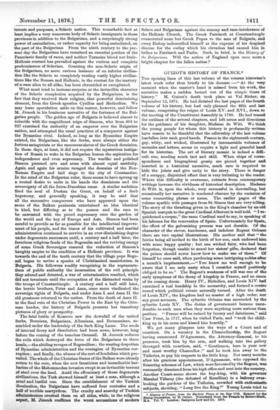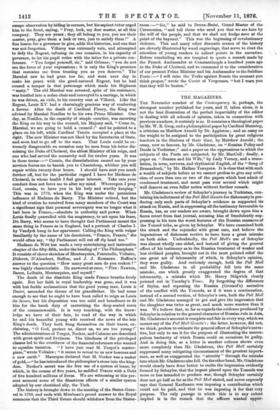GUIZOT'S HISTORY OF FRANCE.*
THE opening lines of this last volume of the veteran historian's latest work refer thus briefly to his decease :—" At the very moment when the master's hand is missed from his work, the narrative makes a sudden bound out of the simple times of history." M. Guizot's death took place at Val Richer, on September 12,1874. He had dictated the last pages of the fourth volume of his history, but had only planned the fifth and last volume, comprising the reigns of Louis XV. and XVI., down to the meeting of the Constituent Assembly in 1789. He had traced the outlines of the several chapters, and left notes and directions for the guidance of his daughter, Madame de Witt. We think the young people for whom this history is professedly written have reason to be thankful that the editorship of the last volume has fallen into such good hands. France in the eighteenth century, gay, witty, and wicked, illustrated by innumerable volumes of memoirs and letters, seems to require a light and graceful hand for its historian. The art of literary -mosaic is indeed a diffi- cult one, needing much tact and skill. When chips of corre- spondence and biographical gossip are pieced together and inserted in a historical narrative, much care is required to hide the joints and give unity to the story. There is danger of a scrappy, disjointed effect that is very irritating to the reader. Where this difficulty is overcome, extracts from contemporary writings increase the vividness of historical description. Madame de Witt is, upon the whole, very successful in dovetailing, but occasionally her narrative is rendered obscure by the omission of some connecting phrase or name. The earlier pages of the volume sparkle with passages from St. Simon that are very telling. The story of the thrashing given in the King's chamber by an old Spanish marquis to the great Cardinal Alberoni is well told. " I re- quickened a corpse," the same Cardinal used to say, in speaking of his labours for the renovation of Spain. Unfortunately for Spain, the effect of the galvanising process was not durable. Of the character of the clever, handsome, and indolent Regent Orleans there are two capital illustrations. His mother said that " the fairies being all invited to the birth of her son, each endowed him with some happy quality ; but one wicked fairy, who bad been forgotten, though unable to annul her sisters' gifts, declared that the prince should never know how to make use of them." Of himself he once said, when pardoning some intriguing nobles after a month's imprisonment,—" You know me well enough to be aware that I am only nasty when I consider myself positively obliged to be so." The Regent's weakness of will was one of the early symptoms of the decay of kingship in France, and an omen of its coming doom. Henry IV., Richelieu, and Louis XIV. had exercised a real headship in the monarchy, and formed a centre round which political events naturally turned. After the death of Louis XIV., the kingdom had no master of a high order, nor any great servants. The sybarite Orleans was succeeded by the sybarite Louis XV. The duties of government became unen- durable to such men when they were anything more serious than pastime. " France will be ruined by luxury and daintiness," said Czar Peter, in 1717, when he visited Paris, and "took the child- king up in his arms and kissed him heartily."
We get many glimpses into the ways of a Court and of courtiers. On a vacancy in the Chancellorship, the Regent having summoned D'Aguesseau, the Attorney-General, to his presence, took him by the arm, and walking into the gallery thronged with courtiers, said, " Gentlemen, here is your new and most worthy Chancellor ;" and he took him away to the Tuileries, to pay his respects to the little king. Not many months after his gracious appointment, D'Aguesseau, who opposed the financing schemes of Law, which were favoured by the Regent, was summarily dismissed from his high office and sent into the country. Another Court-scene shows the boy-king, with his governor Marshal Villeroy (the defeated of Ramillies) in a balcony aver- looking the gardens of the Tuileries, crowded with enthusiastic subjects, shouting, " Long live the King I" Young Louis tried to • History of Prance, from the Earliest Times to the Year 1789. Related for the Rising Generation, by IL Gnizot. Translated from the iremoh by Robert Black, M.A. VoL V. London : Sampson Low and Co. 1876. escape observation by hiding in corners, but his sapient tutor urged him to the front, saying, " Pray, look, my dear master, at all this company. They are yours ; they all belong to you, you are their master, pray, give them a look or two, just to satisfy them !" A fine lesson for a governor to give, adds the historian, and one that was not forgotten. Villeroy was extremely vain, and attempted to defy the Regent, refusing on one occasion, in his capacity of governor, to let his pupil retire with the latter for a private con- ference. "You forget yourself, sir," said Orleans; "yon do not see the force of your expressions ; it is only the King's presence that restrains me from treating you as you deserve." The Marshal saw he had gone too far, and went next day to make his peace with the good-natured Regent, but he had roused a temper in that personage which made his Highness "nasty." The old Marshal was arrested, spite of his resistance, was hustled into a sedan chair and conveyed to a carriage, in which he was driven, an exile, to his country seat at Villeroi. Like the Regent, Louis XV. had a charmingly gracious way of conferring a favour. After the death of Cardinal Fleury, the King was advised by Marshal Noailles to be his own Prime Minister. One day, as Noailles, in the capacity of simple courtier, was escorting the King on his way to the council, his Majesty said, " Come in, Marshal, we are going to hold a council ;" and he pointed to a place on his left, while Cardinal Tencin occupied a place at the right. The new Minister was not liked by the Secretaries of State, and soon had to go off to the wars. That Louis could be ex- tremely disagreeable on occasion may be seen from his letter dis- missing the Duke of Choiseul, the ablest Minister of his reign, and one who had served the monarchy well for twelve years. It was in these terms :—" Cousin, the dissatisfaction caused me by your services forces me to banish you to Chanteloup, whither you will repair within twenty-four hours. I should have sent you much further off, but for the particular regard I have for Madame de Choiseul, in whose health I feel great interest. Take care your -conduct does not force me to alter my mind. Whereupon I pray God, cousin, to have you in his holy and worthy keeping." This was in 1770, when the King was under the pernicious influence of Madame du Barry. The Minister retired, but the kind of ovation he received from many members of the Court was .a significant sign that personal sovereignty was no longer what it had been in France,—absolnte in authority and power. When Louis finally quarrelled with the magistracy, to act upon his fears, Du Barry, who seems to have thought that Parliament meant the same thing in France as in England, had a portrait of Charles I. by Vandyck hung in her apartment. Calling the King with vulgar familiarity by the name of his dominions, "France, France," she would often say, "thy Parliament will cut off thy head too."
Madame de Witt has made a very entertaining and instructive chapter of the fifty-fifth, under the heading of "The Philosophers." It consists of clever sketches of Montesquieu, Fontenelle, Voltaire, Diderot, D'Alembert, Buffon, and J. J. Rousseau. Buffon's answer to the question " How many great men do you reckon ? " was highly characteristic. He answered at once, " Five : Newton, Bacon, Leibnitz, Montesquieu, and myself."
The death of the dissolute King made France breathe freely again. But her faith in royal leadership was gone, and it was with but feeble acclamations that the good young man, Louis is Desiri, ascended the throne of his grandfather. He had sense enough to see that he ought to have been called to reign as Louis the Severe, but his disposition was too mild and beneficent to fit him for the harsh duty of cauterising the deep-seated sores of the commonwealth. It is very touching, with the know- ledge we have of their fate, to read of the way in which he and his beautiful young wife received the news of the late King's death. They both flung themselves on their knees, ex- claiming, " 0 God, protect us, direct us, we are too young The administrations of Turgot, Necker, and Calonne are described with great spirit and liveliness. The blindness of the privileged classes led to the overthrow of the financial reformers who wanted to equalise taxation. " I have just read M. Turgot's master- piece," wrote Voltaire ; " it seems to reveal to us new heavens and -a new earth." Maurepas declared that M. Necker was a maker of gold,—"he has introduced the philosopher's stone into the king- dom. Necker's secret was the free use of a system of loans, by which, in the course of five years, he saddled France with a Debt of five hundred millions of livres. We are witnessing at this pre- sent moment some of the disastrous effects of a similar system adopted by our cherished ally, the Turk.
The history is brought down to the meeting of the States-Gene- ral in 1789, and ends with Mirabeau's proud answer to the Royal summons that the Third Estate should withdraw from the States-
room :—" Go," he said to Dreux-Breze, Grand Master of the Ceremonies, " and tell those who send you that we are here by the will of the people, and that we shall not budge save at the point of the bayonet." This was the beginning of revolutionary violence. This and many other dramatic scenes of the history are cleverly illustrated by wood engravings, that serve to rivet the attention of young readers to salient points in the narrative. Before concluding we are tempted to quote a remark made by the French Ambassador at Constantinople a hundred years ago to the Duke of Choiseul, and to commend it to the consideration of our present Prime Minister and his Ambassador to the Sublime Porte :—" I will raise the Turks against Russia the moment you think proper," wrote the Count of Vergennes, "but I warn you that they will be beaten."

































 Previous page
Previous page